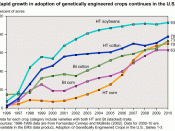For Genetically Modified Food ?Why We Need Food Biotechnology?, by Dennis T. Avery, is an article in the September 2000 issue of the journal, Food Technologyuinb I ijmh htytht. Avery was a senior agricultural analyst in the US State Department and is currently a Directory of Global Food Issues at Hudson Institute in Virginia. It is apparent in the article that Avery is in favor of Genetically Modified (GM) food. Although he addresses certain arguments to this viewpoint, the article is obviously written to persuade the audience to also support Biotechnology. Avery wrote this article in hopes of reaching the common person who may be skeptical about these recent advancements in technology.
The article begins by giving the reader facts and figures combined with history to set a foundation for his upcoming arguments. One of the key points that he makes in the beginning of his article is that 800 million people in the world are undernourished.
We are already using 37% of the world?s land for agriculture. However, it is the well-fed, high income Americans who are ??demanding that society reject biotechnology? (Avery).
Avery then goes on to address two possible arguments to his viewpoint. First, many activists argue that the world could ease the food challenge by becoming vegetarian. Fewer than .5% of Americans are vegetarians so this is obviously not a good solution for the future. A second possible argument is that natural food is best. Avery again looks to history to dispute this, saying that for centuries man only ate natural foods yet the average life span was only twenty-five years. Through today?s advancements in technology, the average lifespan has more than doubled.
The second half of the article is where Avery focuses on several benefits of enhanced foods and gives numerous examples. First, he discusses allergens although some skeptics worry that genetically altered food will cause allergies. Researchers are working to take the natural allergens out of common foods such as milk and peanuts. The next example that Avery gives involves a Biotech corn plant that has the ability to grow 35% faster than regular corn. This would save 140 acres of land. Another type of rice, golden rice, has been genetically engineered to contain beta-carotene which is a vitamin that helps prevent the loss of eyesight. In countries such as China where rice is a staple of their diet, why not help to prevent them from going blind. A final example the author gives is acid-tolerant crops which ??will raise crop yields by perhaps 50% on about half of the arable land in the tropics? (Avery).
I personally found this article to be very educating and enlightening. Although we hear about genetically modified food in the news, most of us really have no idea about the advancements that are being made. Although these advancements are taking place largely on North American soil, their benefits are going to be felt worldwide , especially in third world countries that don?t have the means to develop this variety of crops naturally. My personal viewpoint is very similar to the one Avery presents in this article. I see the advancements as a help rather than a hindrance. I agree with Avery?s statement that ?activists complain that science is taking over our lives. But science is simply the confirmed reality of the world? (Avery).





